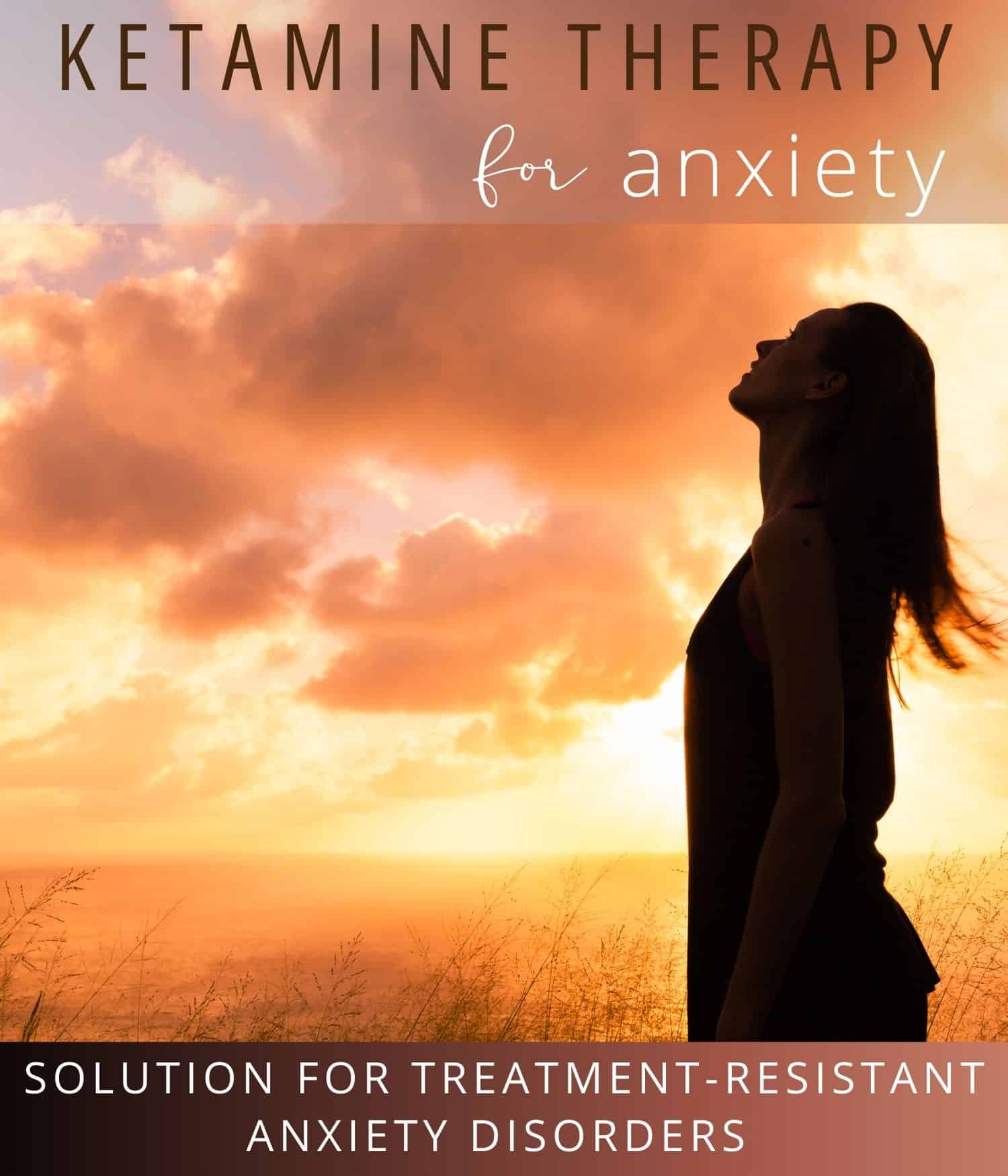

Schedule an appointment via call or text at
(385) 685-1410 or fill out the form below:
Schedule a Ketamine
Treatment Consultation
By submitting this form you agree to be contacted via phone/text/email
Ketamine Therapy for Anxiety
Occasional anxiety is an expected and regular part of life. Temporary feelings of anxiety are a human’s natural reaction to stress and change. Anxious emotions may accompany new experiences, life-changing decisions, or preparations for an important event. Usually, these moments of anxiety pass and the usual range of human emotions continue to progress.
However, for people suffering from anxiety disorders, these anxious feelings do not go away and often intensify and worsen over time. These deepening feelings of anxiety may eventually reach a level where they interfere with a person’s life. Ultimately affects close relationships, and performance at work or school, and causes other physical side effects that affect mind and body wellness.
At Ketamine Therapy at Therapeutic Alternatives, we are committed to bringing this life-changing treatment option to the Salt Lake City community. It is carried out in a safe, comfortable setting where mind and body healing can happen.
Our board-certified nurse practitioner and licensed mental health professional are both trained in Emotion-Focused Ketamine-Assisted Psychotherapy. In addition, they have many years of combined experience working in mental health settings. To learn more about our treatment plans centered around Ketamine therapy for anxiety, call (385) 685-1410 to schedule your no-cost consultation.
According to the Anxiety and Depression Association of America, the most common mental illness in this country is anxiety disorder. Current estimates suggest that anxiety disorders affect nearly” 40 million adults in the United States age 18 and older, or 18.1% of the population every year.”
Anxiety is a natural human response to perceived threats or dangers. It has helped us survive and adapt to our surroundings over time. But when anxiety becomes excessive, it can harm our well-being and lives. Anxiety disorders are among the most common mental health conditions worldwide. There are several types of anxiety. Each has its unique symptoms and attributes—let’s explore them.
Generalized Anxiety Disorder (GAD)
You may have a general anxiety disorder if you constantly worry about everyday events or activities. GAD patients may have difficulty controlling how much they worry [1]. As a result, they experience physical symptoms like fatigue, muscle tension, and moodiness.
Social Anxiety Disorder (SAD)
Do you have an intense fear of social situations? You may have a social anxiety disorder. People with SAD often avoid social situations or may feel uneasy in them. Social anxiety can disrupt relationships, work, and daily life [2].
Obsessive-Compulsive Disorder (OCD)
OCD patients often have repetitive and intrusive thoughts or obsessions. This can lead to compulsive behaviors or rituals [3]. People with OCD may feel compelled to do certain things to alleviate their anxiety.
Panic Disorder
If you get sudden and unexpected panic attacks, you may be dealing with a panic disorder [4]. This can cause intense fear and physical symptoms like shortness of breath, chest pain, and palpitations.
Several factors and influences may cause anxiety in people:
Genetics
If your family has a history of anxiety disorders, you may be more prone to the condition.
Brain chemistry
Imbalances in the brain may affect mood and anxiety levels. Stressful life events or chronic stress can trigger anxiety.
Environmental influences
Traumatic experiences like abuse or neglect can increase the risk of developing anxiety
Until recently, most patients suffering from anxiety disorders received treatment that included psychotherapy, medication, or both. Even after using anxiety treatments like therapy and medication, many people still struggle with debilitating symptoms. Often, the level of severity of these symptoms of anxiety proved resistant to medication and therapy. This lack of successful alternative treatments left both patients and therapists frustrated with the inability to progress past treatment plateaus. With the discovery of Ketamine’s therapeutic effects, Ketamine therapy has become an innovative, novel therapy for helping patients manage and reduce their anxiety symptoms.
When used in a controlled and professional setting, Ketamine may provide anxiety relief. Specifically, it blocks the brain’s N-methyl-D-aspartate (NMDA) receptor. This can significantly reduce anxiety symptoms.
Ketamine isn’t a cure for anxiety and shouldn’t be a first-line treatment. Most doctors have their patients try traditional therapies first. If they don’t respond to these treatment options or are experiencing severe symptoms, Ketamine may help.
First, consult with Ketamine Therapy at Therapeutic Alternatives. We’ll assess your mental health needs and determine if Ketamine is right for you. Usually, patients receive Ketamine via injection or infusion. The dosage and treatment frequency vary depending on your condition and how your body responds to the drug.
While Ketamine can provide rapid relief from symptoms, it shouldn’t be the sole long-term solution for anxiety. Get the most benefit by practicing therapy and other holistic approaches to improve your well-being.
Ketamine is a medication first approved in 1970 for use as a sedative. As a popular anesthetic, Ketamine often is preferred because it does not affect a patient’s breathing.
Recent research on Ketamine usage showed that this medication provided a noticeable improvement for various mental illnesses at low, therapeutic doses. In 2019, Ketamine received FDA clearance to treat depression and has already remarkable feedback as the “most significant breakthrough for treating depression in half a century.”[1]
Generally, Ketamine has been shown to positively affect and reduce the symptoms of all the significant categories of anxiety disorders such as;
- Generalized Anxiety Disorder (GAD)
- Obsessive-Compulsive Disorder (OCD)
- Panic Disorders
- Post-Traumatic Stress Disorder (PTSD)
- Social Anxiety Disorder (Social Phobia)
- Phobia related disorders
Ketamine therapy, in conjunction with psychotherapy, such as therapy or counseling, has been proven to quickly and effectively reduce the symptoms of anxiety and help prevent recurrent episodes. One trial, published in Salvadore et al., 2009, featured 11 depressed participants who, after receiving a Ketamine infusion, showed a significant reduction in their symptoms relating to anxiety disorders within a concise time frame[2]. Furthermore, another study concluded that “this proof-of-concept trial provides initial evidence that ketamine may be effective in reducing anxiety.”[3]
Ketamine therapy has become the hopeful new alternative treatment for anxiety disorders that have proven resistant to traditional treatment plans focusing on psychotherapy and medication. Ketamine for anxiety disorders treatment targets the neurological causes of mental illness instead of only dulling the symptoms. Ketamine therapy enables the mind to heal its malfunctioning neurons and to create new neural pathways needed. The safe, calming effects of this therapy positively affect those with anxiety disorders even long after the drug has left the body. Positive effects from Ketamine for anxiety treatments can last up to 2 weeks after a transfusion. The physiological anxiolytic (anti-anxiety) boosts from this treatment help boost a patient’s mood, positively affect their perspective, and create new neural pathways.
Ketamine and anxiety: What can I expect?*
During treatment, you may feel a sense of dissociation or detachment from your surroundings. This can be disorienting at first, but it can also provide a sense of relaxation and (anxiety relief).
Each person’s experience with Ketamine and anxiety is unique.* Work with a qualified provider like Ketamine Therapy at Therapeutic Alternatives to ensure the best possible outcome.
How many Ketamine treatments for anxiety should I get?
The severity of your symptoms and how you respond to Ketamine will determine the number of treatments you need. Some people may find relief after one or two sessions. Others may need more to achieve the desired results.
Ketamine treatment isn’t a one-size-fits-all solution. A thorough consultation will allow us to evaluate your needs and devise an effective treatment plan. This will detail how many sessions you need and how much the overall treatment will cost.
How much does Ketamine for anxiety cost
The cost of Ketamine treatment varies depending on factors, such as:
- Type of treatment
- Prescribed dosage
- Session frequency
Ketamine therapy is an investment in mental health and well-being. The cost may be worth it for people who haven’t responded to traditional medicine.
Get a personalized quote for Ketamine therapy by scheduling a consultation with Ketamine Therapy at Therapeutic Alternatives. We’ll review your medical history and recommend a treatment plan tailored to your situation.
Ketamine Therapy SLC at Therapeutic Alternatives is a premier Ketamine for anxiety provider in Salt Lake City, Utah. Do you struggle with anxiety, despite trying traditional therapies? We may be able to help you finally get relief. Call (385) 685-1410 to schedule a free consultation. Learn more about Ketamine for anxiety and how to live your life to the fullest.
Our mental health clinic in Salt Lake City, UT, combines experienced counseling services with skilled medical technicians to bring this new healing treatment safely and effectively to our patients.
Schedule a Ketamine
Treatment Consultation
Schedule an appointment via call or text at (385) 685-1410 or fill out the form below:
By submitting this form you agree to be contacted via phone/text/email
SOURCES:
[1] “Facts & Statistics.” Anxiety and Depression Association of America, ADAA, adaa.org/about-adaa/press-room/facts-statistics.
[1] Duman R. S. (2018). The Dazzling Promise of Ketamine. Cerebrum : The Dana forum on brain science, 2018, cer-04-18.
[1] Increased anterior cingulate cortical activity in response to fearful faces: a neurophysiological biomarker that predicts rapid antidepressant response to ketamine. Salvadore G, Cornwell BR, Colon-Rosario V, Coppola R, Grillon C, Zarate CA Jr, Manji H, Biol Psychiatry. 2009 Feb 15; 65(4):289-95.
[1] Taylor, Jerome H, et al. “Ketamine for Social Anxiety Disorder: A Randomized, Placebo-Controlled Crossover Trial.” Neuropsychopharmacology : Official Publication of the American College of Neuropsychopharmacology, Nature Publishing Group, Jan. 2018, www.ncbi.nlm.nih.gov/pmc/articles/PMC5729569/.
“Generalized Anxiety Disorder: When Worry Gets Out of Control.” National Institute of Mental Health. Link.
“Social anxiety disorder (social phobia).” Mayo Clinic. Link.
“Obsessive-Compulsive Disorder.” National Institute of Mental Health. Link.
“Panic Disorder: When Fear Overwhelms.” National Institute of Mental Health. Link.
DISCLAIMER:
*By submitting this form you are to be contacted by Ketamine Therapy at Therapeutic Alternatives and receive marketing messages via phone, text, or email. You will be able to unsubscribe from these communications at any time. We are committed to protecting and respecting your privacy. For more information, please review our Privacy Policy.
Schedule a Ketamine
Treatment Consultation
By submitting this form you agree to be contacted via phone/text/email


